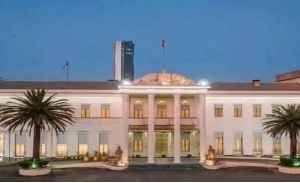A trying time such as this needs the coordination and collaboration of all segments of the society. In fact, when all are united, no one is left behind. Particularly it requires active and continuous support of the diaspora community, which lends its hands to the needy and disadvantaged individuals who are in miserable circumstances, through engagements of humanitarian and social welfare programs.
Due to various factors many people find themselves trapped in poverty and physical, psychological sickness; but there are some humanitarian individuals who make themselves available during difficult situations. Among them is Yosef Ewnetu. He is a member of the Ethiopian Diaspora who engages in a humanitarian program for the dual purposes of supporting himself, as well as helping marginalized people.
Yosef left his home country in 1987 and immigrated to Uganda to live with his sister. In 1988 he went to the USA with his two younger brothers to live with their older brother. He studied Airframe & Powerplant Mechanics at Dallas Aero Tech and worked for thirteen years in two small aircraft Engine companies as Inspector, Chief inspector and Department Manager in Dallas Texas.
In 2011, after returning to Ethiopia, he established Mercy Feeding Center with some members of Mercy Church and together they were feeding 610 unprivileged students in nine Addis Ababa public schools, Monday to Friday.
Later, he then founded Raffa Medical Clinic, whose motto is “The Home of Healing”. This clinic provides medical care for both physical needs, such as internal medical, emergency treatment, minor surgery, full laboratory testing and so on; as well as psychiatry and mental health services. It particularly focuses on mental health issues including depression and related disorders, addictive and substance abuse, bi-polar disorder and family therapy.
Excerpts:
Herald: Tell us about your success and your accomplishments?
Yosef: First, my successful career is joining the aircraft industry, second, returning to Ethiopia after a-21 years of stay in the USA and providing a way for more than 610 kids to focus on school as we provided their meals Monday to Friday, and now establishing Raffa Clinic. These are some of my successes and accomplishments.
Herald: What drives you to engage in philanthropic service?
Yosef: When we came to Addis Ababa in 2008, we were visiting Amanuel Mental Hospital and heard that after patients leave the hospital, they have difficulty in finding jobs and reintegrating into the society because of the stigma as a result of the mental illness. Which then leads to depression and inability to support themselves.
This drove me to want to do something to help. While preparing to establish a mental health recovery center, we heard that students were struggling to study as a result of the lack of food. Again, I felt that I needed to do something to help, but I had to put the recovery center on hold since this felt like a more pressing need. In August 2011, we got a license as an NGO and started feeding 40 kids in our mother’s house (with the permission of my siblings in Dallas Texas, USA).
The students ate breakfast and took lunch from Monday to Friday and we fed them lunch on Saturdays. After we did this for some time, we came up with a new plan. The plan was set up to allow us to reach a larger number of students. We spoke to the local public school to see if we could come to the school to provide lunch there. The school leaders were very happy to hear that we wanted to help. We came up with an agreement with the school; they agreed to provide us with two rooms – a kitchen, and a place where students can eat. We provided the food and people to serve the food to the students.
This way, we (at Mercy Feeding Center) were able to provide much needed lunch to a lot of children who require such attention.With Mercy Feeding Center we were able to feed 610 unprivileged students in nine public schools Monday to Friday. Later, after seven years, we returned to our original vision and established Raffa Medical Psychiatry
Clinic. That is how we started humanitarian services for our people.
What drives me is the desire to alleviate some of our people’s problems, needs and struggles and the dream to see them reaching their full potential in their lives. Herald: How do you assess humanitarian activities here in this country?
Yosef: It is difficult to analyze and recognize humanitarian activities in a simple and expressive way. It is very encouraging to see that more Ethiopians are engaging in different humanitarian arenas than ever before. Not only in providing food, but you see mental and recovery centers, nursing homes for the elderly, help for street kids and so on. Our people are also increasing their support for these blessed causes by giving their money, time, talent and sometimes their precious lives.
I think a lot of people here in Ethiopia want to help. The culture also encourages helping one other. But to be rather frank, the society doesn’t know how to help and contribute. Most people’s attitudes towards humanitarian NGOs are also characterized by suspicion, because they think NGOs are just self-serving entities. A concerted effort to curb this negative attitude and make people aware about how they can contribute in helping those in need is very much necessary.
Herald: Why you think the diaspora community seems reluctant to deploy themselves in the humanitarian and social work?
Yosef: Ethiopians naturally and culturally have a cordial heart to help their people. They are willing to support the needy in an altruistic manner. Whenever you go, you come across people who lend their hands to beggars and homeless individuals. But, the problem is that few individuals are willing to share what they have on a focused and larger scale. The diaspora community also
try to help in different ways as far as I know. I know my brothers and my sisters allowed me to use our home without rent payment for the feeding center and for Raffa Clinic, for example. The diaspora community wants to invest and support this country, but they don’t know how, where, what to start. It is also very difficult to re-settle in the country and continue with the comfort and convenience that they have become used to. There are, actually many numbers of diasporas have a great interest to be involved in humanitarian or business programs, but there is no convenient platform facilitated by the concerned body. It is not easy to do it.
Herald: What makes your health care center different from others?
Yosef: According to the USA library of medicine, roughly 50% of all adult primary care patients have a psychiatric disorder. According Amanuel Mental Hospital, it estimated about 25 million Ethiopians suffer from some form of mental disorder, while less than 10% receive any form treatment, and less than 1% receive specialist care. Current evidence supports that an integrated and collaborative approach between psychiatry and medical care is an effective treatment of patients with both psychiatric and medical problems. Raffa Clinic is the only primary clinic, as far as we know, that it uses this integrated and collaborative approach between medical and Psychiatry care services in Ethiopia. By integrating mental health service andmedical care, we are striving to ensure that people receive the medical and psychiatry care they desperately need. In addition, we are working with Arada Sub City, where the clinic is located, and agree with them to send us up to 90 unprivileged people every month, that wecan provide medical and psychiatry care for, completely free of charge. That makes us different from the other medical clinic centers.
Herald: How do you see Ethiopian
Airlines services based on the experiences you have had?
Yosef: I don’t know much about the Ethiopian Airlines because I did not work for the company. I think Ethiopian Airlines is not only the fastest growing Airline and also very profitable and successful one. I don’t think or believe this great success came accidentally but is a result of vision and the hard work of thededicated and talented management, and employees, through the years. Since I moved back to Addis Ababa, I heard some complaints here and there from the employees about their wages being low compared to employees from nationals who work for the Airlines.
To survive and to grow in this very competitive, challenging time in the airlines industry, I think Ethiopian Airlines needs to give the best salary and incentive to all their employees. Otherwise in the near future the Airline will have difficulties to attract and retain the best and the brightest employees. This happens in our health sector-our medical doctors learn and graduate,in some cases from free education,and then after a few years you see them working for hospitals in other countries because we were not able to compensate them well enough here.
Herald: What are the main challenges you faced when you decided to invest in your homeland?
Yosef: To start with, it entails having a huge vision to start an investment in Ethiopia, because of the challenges around infrastructure such as the reliability of electricity and water, internet access, material resources, foreign exchange and so on. In addition, it has been difficult even to mobilize the necessary human resources. Finance is also a challenge. Recently, I was trying to secure a loan from one of the well-known banks but when they told me what the interest rate would be I was not surprised, but disappointed. I think if the bank system makes the interest rate lower and more accessible to small business like me and others, the economy can grow, it will allow us to hire more people, which can reduce unemployment and generate income for the government in the form of taxes.
Herald: Finally, what message would you like to convey?
Yosef: All humans have different values, religions, goals, perception and different opinion etc.
In every walk of life, people want to be appreciated, respected, encouraged, treated equally, have incentive, be able to participate in a bigger vision, be in a team and treated as a family. We need to strive to be individuals, organizations and businesses and in our nationthat treat people in a meaningful and motivational way so that we would be able free from division and frustration. Remember the foundation with relationships is built on mutual understanding of each other’s feelings, concerns and truth in this life. Let us then contribute what we have in terms of our talent, energy, any resources we have, for good of humanity specially for our people. Martin Luther King Jr once said, “We are challenged to rise above the narrow confines of our individualistic concerns to the broader concerns of all humanity.” That is the message what I would like to share.
The Ethiopian Herald July 19,2020
BY MEHARI BEYENE




